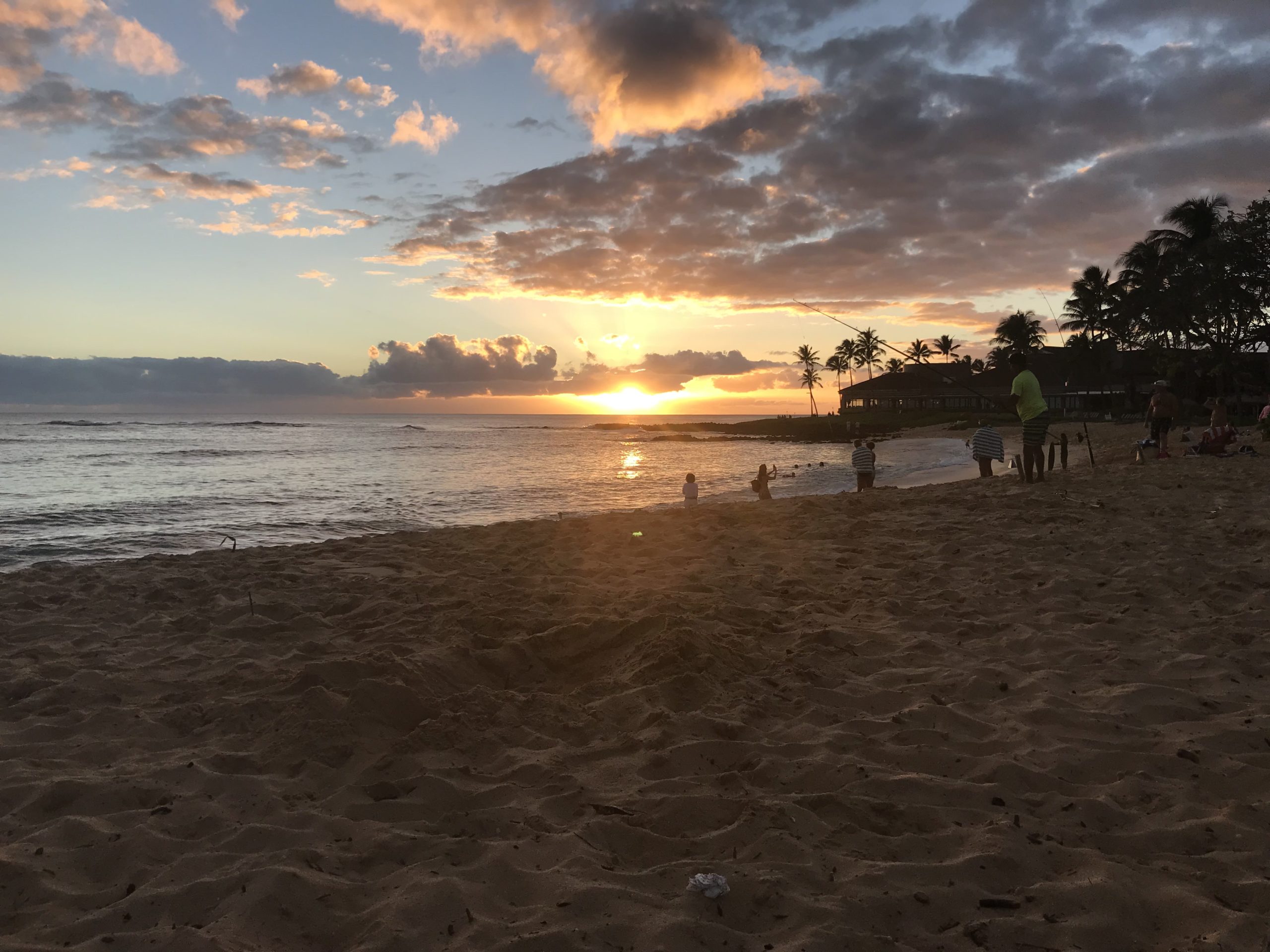On a Wednesday two weeks ago, I stopped to talk to two tourists sitting in hotel chaise longues. Their flight home to Berlin was canceled. They were two of seven remaining guests occupying three of the Kauai Sheraton’s 391 beachfront rooms. The morning was overcast, the trades blowing a little stronger than usual. And the German couple were cheerlessly trying to milk one more day out of a vacation gone south. So there they sat, watching the shore break on the white sands of Kiahuna Beach.
The bartender at the Lava Lounge said they would be open until the last guest checked out. By the following Wednesday, the Germans were gone, and the hotel was closed. Count them among the last of 28,000 visitors to leave Kauai before it shut down.
Closed for business, the island seems even more Edenic than it was a month ago.
I can walk along the seawall and watch waves turn from blue to seafoam green to white froth, crashing on black volcanic rock. I can stop at a small cove and swim in glorious solitude. Two miles west of the Sheraton, there is not a soul on a beach as pristine as it must have been when Captain James Cook arrived here in 1778, bringing with him syphilis, even as he warned his men not to mingle with the natives. Then came measles and smallpox, which in the original sense of the phrase “went viral” and ravaged the indigenous population. Christianity and the six-day workweek would follow.
And now this virus, which has given the island back to those of us who live here. I know that my claim to this place is a tenuous one. Like the apple snail, the feral pig, and the retired CPA from San Diego who lives in a plantation-style house next to mine, I’m an invasive species.
I suppose my wife has a birthright claim. Her paternal grandfather arrived here from southern Japan in the late 1890s as a contract laborer signed on to cut sugar cane, then by pluck and luck landed a coveted “house boy” job on one of the island’s five or six latifundia—vast plantations owned by Europeans who used immigrant workers to turn rich volcanic soil into pineapple and cane fields.
His early work history tells a big part of the story of this island: a contract laborer arriving from Japan to work on a plantation owned by Germans on land purchased at risible prices from Hawaiian royalty.
But here I am. In our second home that has pushed real estate prices and taxes upward, enjoying life on a tropical island a third less populous than it was when the president promised us that the Covid-19 virus was, you know, “like the flu.”
We’re a one-industry economy. When that economy collapses, it collapses vertically. The pineapple fields Elvis cruised through in Blue Hawaii are now in the Philippines. The last sugar crop was harvested in 2009, and the Koloa Sugar Mill is a rusting industrial hulk, abandoned on hundreds of acres of invasive pampas grass where Ainakea sugar cane was once cultivated.
Since Cook’s arrival in 1778, most of the work here that doesn’t involve sitting at a desk has involved people with dark skin employed by people with lighter skin. Today the island is kept afloat by Ilocano Filipinos, many working two service-industry jobs a day to scrape by in a state where the median price of a home is $520,100 and the annual cost of a self-sufficient life for a family of four is $70,750.
The Hotel & Restaurant Employees and Bartenders International last year organized Sheraton workers on the promise of a “One Job Should Be Enough” campaign. Yet it’s a safe bet that the Filipino bartender serving seven guests there two weeks ago lost two jobs and is today scrambling to cobble something together to get him through the next six months. As is the staff of 300 that walked out of the hotel lobby doors and into an uncertain future.
Nine hundred workers at Grand Hyatt on Shipwreck Beach, the largest private employer on the island, are left to wait for the bailout checks Treasury Secretary Steve Mnuchin says are “in the mail.”
The Kukui Grove 4 movie theater, where attendance was so low that for the past 10 years you could see a film while practicing social distancing, closed its doors on March 31.
The local fish market is no longer open, boat captains have cut the price of yellow-fin tuna they’re selling out of their houses, and small businesses operating on thin margins have closed their doors. Many won’t reopen.
Closing an island where, thus far, there have only been 15 reported incidences of Covid-19 virus is a lot easier than stopping New Yorkers driving north to Vermont.
There’s one seaport and one airport, and all arrivals go directly to 14 days of isolation supervised by the state department of health.
Kauai police are conducting traffic checks and have arrested two tourists who slipped onto the island and out of quarantine and maybe into a $5,000 fine and a year in prison.
Mayor Derek Kawakami ordered a 9 p.m. to 5 a.m. curfew and warned visitors to stay away.
“Kauai is on vacation,” he said, which I read as his peculiar way of advising tourists there will be no one to provide for them if they manage to get here.
But an odd thing to say when it’s evident that working people on this island are going to be hurting for a long time.
Late one afternoon recently I sat on a beach and listened to a newly laid-off musician entertain himself playing slack-key guitar and singing in Hawaiian.
It’s not a language I understand, but the chorus he repeated in a gorgeous sustained falsetto had a forlorn quality I’d never before heard on this island.
Lou Dubose, the former editor of The Washington Spectator, is doing research for a book and riding out the pandemic in Kauai.







I have been reading The Washington Spectator for about sixty years and it is my go-to newspaper;
I have also sent subscriptions to friends, as my sister originally signed me up. As my sister lives in Hawaii and her children grew up there–and she worked for the City of Honolulu I know about some of the circumstances, but Lou Dubose’s article was particularly touching. These are hard times and those who are well off are that much more obligated to help those in need.
Natalie Beaumont